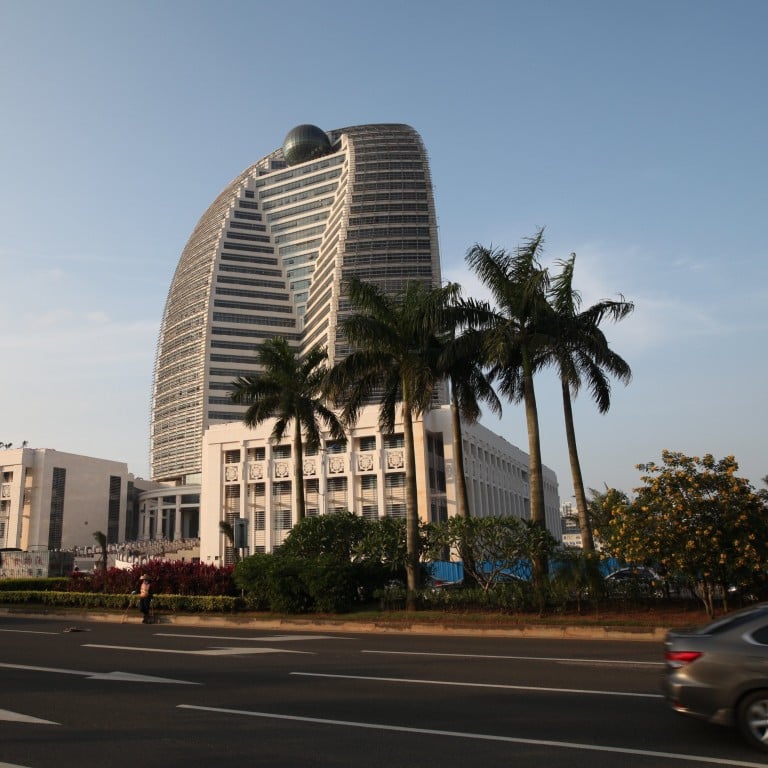
HK Express deal exposes Chinese conglomerate HNA Group’s key assets as debt repayment pressure mounts
- The distressed former global assets acquirer faces debt repayment of US$2.8 billion this year and US$30.7 billion by 2025
- Uncleared debts and possible sale of blue chip assets make survival difficult for Chinese group
HNA Group has to be smart about its asset disposals as the sale of Hong Kong Express Airways is barely a drop in the bucket for the distressed Chinese conglomerate’s debt obligations and exposes its income-generating assets, say analysts.
HNA on Wednesday agreed to sell the low-cost carrier to Hong Kong-based Cathay Pacific Airways for HK$4.93 billion (US$628 million). According to a stock exchange filing on Wednesday, Cathay will pay HK$2.25 billion in cash and repay HK$2.68 billion of debt held by HK Express.
The proposed sale just about covers 22.5 per cent of repayments on bonds and term loans of 18.9 billion yuan (US$2.8 billion) due this year, which rises to 205.9 billion yuan by 2025, Bloomberg data shows.
David Yu, finance professor at New York University Shanghai, said that since HNA is in need of additional funds they have to sell smartly to get a good price especially when more of its loans are maturing and there is motivation to sell.

“It might be difficult to achieve a ‘good deal’ when there is this pressure from the debt repayments overhang,” he said.
Over the past two years asset sales have amounted to more than US$40 billion but HNA has not been able to keep up with debt repayments.
Brock Silvers, managing director at Kaiyuan Capital, a Shanghai-based investment firm, said that the sale of HK Express shows that HNA is being pushed to the edge, forcing it to dispose core aviation assets as creditors come knocking on its door.
Embattled Chinese conglomerate HNA to sell its Hong Kong-listed construction unit to Times Holdings for US$890 million
“Where the former management team presumably had an attachment to the company’s core business lines or favoured acquisitions, the emphasis now is on stabilising the balance sheet and avoiding default,” Silvers said.
He added that for Cathay the deal makes sense as it protects and expands the company’s home market. However, the money-losing asset is no longer as valuable for HNA.
HK Express reported HK$141 million in losses last year.
“Asset disposal is becoming more and more difficult as easy monetisation is over ... it is possible that the company could go bankrupt. This year, particularly the second half, is critical for them as they will face the biggest repayment pressure,” Silvers said.

Chen Feng, the founding chairman of the HNA Group, attempted to paint a rosy picture when he told the media last November that the “crisis was over” after having divested assets of more than 30 billion yuan to repay debt.
But the group’s financial situation has continued to deteriorate. Despite making one major divestment every few weeks, the speed of asset sales has not kept up with maturing debt payments.
It has since sold stakes in Deutsche Bank, land parcels in Hong Kong and office buildings in Shanghai and New York.
On March 16, the flagship unit under the HNA Group, the Shanghai-listed Hainan Airlines said more than 27.8 per cent stake of the company, worth 10.5 billion yuan, was frozen by a court in Shandong. The court passed the order because of a contract dispute between HNA Group and a local aircraft leasing company. Local media reported that HNA was behind on its aircraft lease payment.

A day later, the HNA Group was unable to make a payment on a 3.5 billion yuan privately placed note, but it was cleared a few days later.
On Wednesday, Hainan Airlines revised its 2018 net loss forecast to between 3 billion yuan and 4 billion yuan from an earlier forecast of 500 million yuan, citing asset impairment, fewer subsidies and lower investment return.

